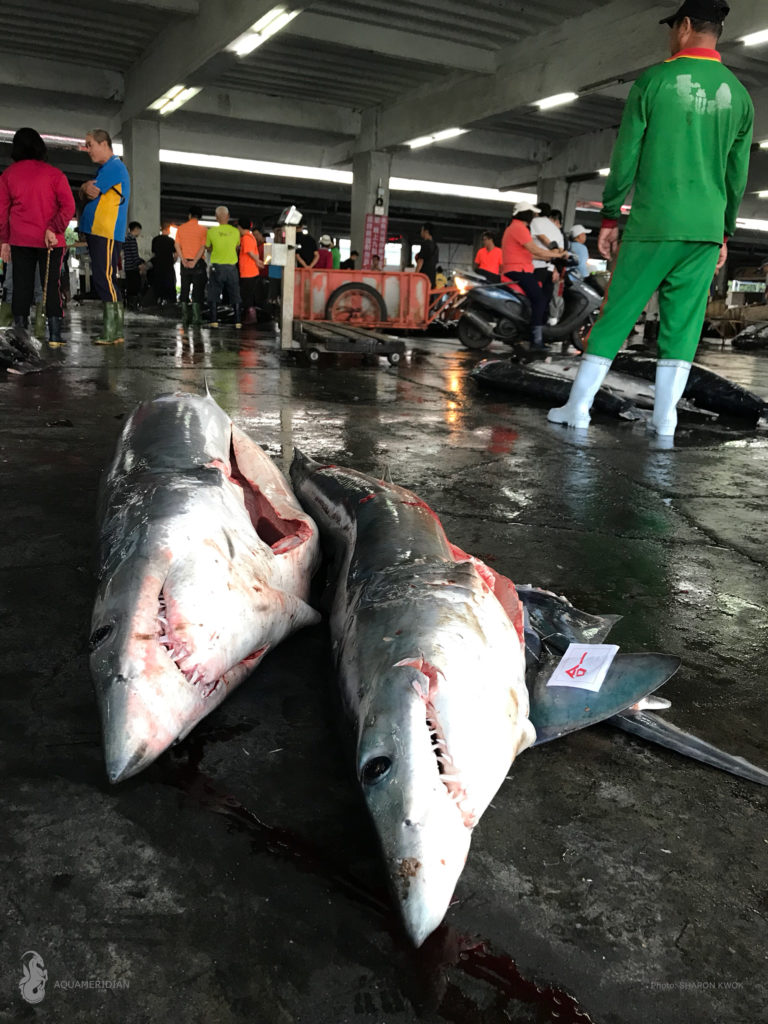How the Donggang Fish Market Reflects the Current State of the World’s Big Fish
September 24, 2018
By Sharon Kwok, Mission Blue Board Member
It was 3:00 am and business was in full swing in Hua Qiao seafood wholesale market, located in Donggang Township, nestled along the western coastline of the Taiwan Strait. Although the South of Taiwan is a common Hong Kong tourists’ destination, most don’t venture to Hua Qiao and when they do, it’s usually not during wholesale trading hours. They also generally stay where the restaurants are. I instead, drove through the gate to the wholesale area and was assaulted by the sounds of organised chaos filling the brine and blood scented air. Built on a strip of land resembling a finger pointing southwest, the trade area allows Tuna Long-liner fishing boats to easily unload and boasts a substantial parking area sandwiched by massive buildings dealing in every form of seafood you can imagine. One building sells portions off of larger fishes while another sells piles of seafoods laid out on pieces of tarp or in polystyrene foam boxes. Massive cranes run the length of the vessel unloading area to help lift extremely heavy fishes from hulls when needed. Those cranes were idle today, as they have been for most days throughout the past several years.

So, where have the big fish gone?
7 years ago, l also visited Hua Qiao. My photos from that trip show moon fish and hundreds more large fishes of pelagic species. Even the reef fishes seemed more abundant, with dozens of massive Goliath Groupers being traded, and there were piles formed of dozens of whole large sharks. Then, l remember seeing 8 massive Bluefin Tuna being hoisted out of vessels on to carts. This time, l only saw 5 medium sharks, much less bill fishes although there were still dozens of marlin and sailfish, and no Bluefin Tuna…only Yellowfin and other small tunas.

The United Nations Food & Agriculture Organization states that 90% of global fisheries is either fully exploited or facing collapse. We are emptying our oceans much faster than fish stocks can reproduce. It doesn’t matter where in the marine food chain we tap into, any missing link affects the whole chain and we are seeing the results. In a global fishing trade estimated at US$130 billion, the top three fish-producing nations are all Asian, being China, India and Vietnam. According to a 2015 study by the University of British Columbia, the South China Sea produces at least 10 million tonnes of fish each year. That’s 12% of the global catch. However, the actual amount would be much higher as the data doesn’t include illegal and unregulated fishing.

For millions of people in coastal areas, The depletion of fish stocks is of serious concern as seafood provides a major source of protein and income. Shortage creates increased competition which aggravates the problem in other ways. Problems like unregulated trawling and illegal fishing methods such as blast-fishing or fishing with poisons such as cyanide destroy breeding grounds. This means even greater problems for our future.

How to tackle this massive problem, before it is too late?
We might as well be living in a Matrix supported by commercialism. For the most part, this may not pose a problem to society and in fact may sometimes provide positive results, but when it comes to our demands on nature and natural resources we are failing miserably. Consumers are constantly bombarded with food advertisements that tempt the palette and purse-strings. On land, this has had massive impact on farming and agriculture. We have learned that it isn’t sustainable to eat apex predators such as lions, tigers, and bears which would be too expensive to grow. However, most folks don’t spend much time under the sea. We are therefore, semi-blind to the enormous burden we have been placing upon our oceans.

Hong Kong has been a glorious fishing port which supplied China with dried seafoods for centuries, our fisheries finally collapsed due to commercial demand and non regulated fishing. The Hong Kong government banned trawling on the 1st of Jan, 2013 and has been amending the ban to date, the last time was on the 8th of June, 2018. We have seen a steady increase of folks who are passionate about marine protection. I remember first researching with Reef Check Hong Kong in 1997 with just a handful of people but today we boast over 50 teams. As a whole, we must become more educated and responsible in order to sustain mankind unto future generations.








Management is crucial and effective. Bristol Bay Alaska has successful mananged the salmon fishery with cooperation from state and private parties, including the fisherman. But we still need more. Wild fish are crucial.
Thank you for documenting and keeping this issue out there